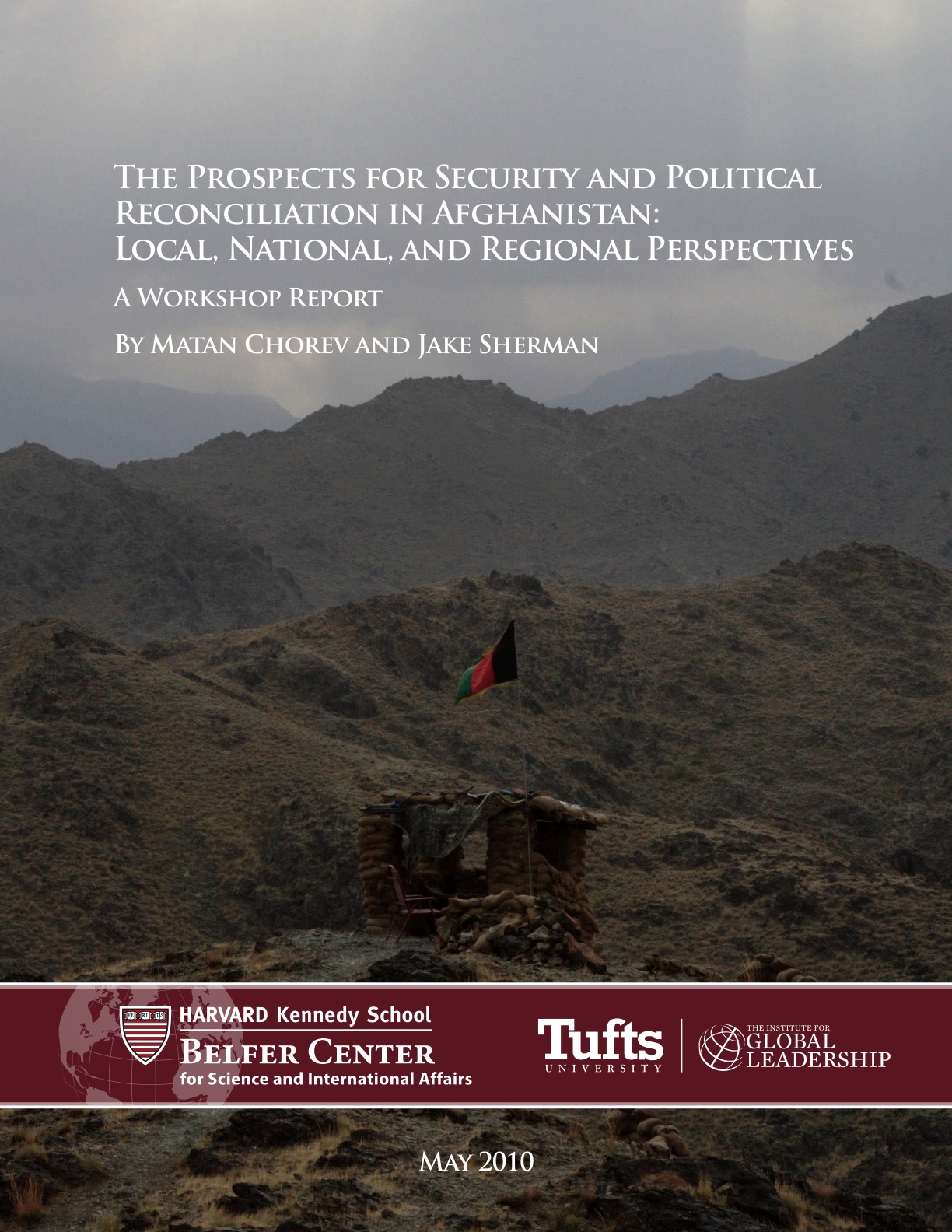Prospects for Security and Political Reconciliation in Afghanistan; Guideposts for Policymakers

|
|
Prospects for Security and Political Reconciliation in Afghanistan
Guideposts for Policymakers
The Tufts University Institute for Global Leadership (IGL) and Harvard Kennedy School’s Belfer Center for Science and International Affairs are pleased to publish the report “Prospects for Security and Political Reconciliation in Afghanistan: Local, National, and Regional Dimensions,” based on two days of intense discussions hosted by the IGL at Tufts University.
The workshop, supported by the Compton Foundation, was initiated by the Institute for Global Leadership as part of its 2009-10 focus on “South Asia: Conflict, Culture, Complexity and Change.” It is also part of the Institute’s 25th anniversary programming, with IGL alumni specifically chosen as the conveners.
Written by workshop co-conveners and IGL alumni Matan Chorev and Jake Sherman, the report summarizes the predom¬inant views of a select group of Afghan politicians and former military officials, Pakistani journal¬ists and scholars, current and former United Nations officials, diplomats, humanitarian workers, and representatives from the U.S. military on the opportunities for, and obstacles to, security and political reconciliation in Afghanistan.
The report concludes that “the near-term prospects for security and political reconciliation in Afghanistan are bleak. Nonetheless, the United States, its coalition partners, and neighboring states can still assist in shaping sustainable, Afghan-led stabilization.”
“The report offers guideposts to policymakers based on the enormous experience of the participants and eight years of painful lessons learned to guide policy,” says Matan Chorev. “It encourages policymakers to move beyond material incentives in the design of reintegration and reconciliation programs and to give primary focus to the political drivers of the conflict at both the local and national levels.”
Recommendations include:
• Draw on the Taliban narrative of “a moral force fighting corruption and anarchy,” to create opportunities for members of the Taliban and their supporters to join the peaceful political process. Ensure that any narrative of reconciliation also appeals to non-Taliban peaceful op¬position groups.
• Guard against the moral hazard risks in the R&R effort, particularly those that signal that the “politics of disruption” pay, with the consequence of providing unintended incentives to indi¬viduals to participate in violent opposition activities.
The full report is available at:
Prospects for Security; Political Reconciliation in Afghanistan - HKS-Tufts Workshop Report
The authors can be contacted directly at:
Matan Chorev matan_chorev@harvard.edu 617-496-6790
Jake Sherman jake.sherman@nyu.edu 212-998-3606
Jake Sherman is Associate Director for Peacekeeping and Security Sector Reform at the New York University Center on International Cooperation. He is a lead researcher for the CIC Afghanistan Reconstruction Project, which supports efforts by the Afghan government, Afghan civil society, the United Nations Assistance Mission in Afghanistan, and donors to carry out a more effective reconstruction mission based on the Bonn Agreement and the Afghanistan Compact focused on Afghan ownership. In 2009, he co-authored the briefing papers, “The Public Cost of Private Security in Afghanistan,” “Building on Brahimi: Peacekeeping in an Era of Strategic Uncertainty,” and “The Afghan National Development Strategy: The Right Plan at the Wrong Time?” published in the Journal of Security Sector Management. He is on the editorial board of the Security Sector Monitor of the Center for International Governance Innovation and has worked for the United Nations Assistance Mission in Afghanistan. During 2008, he was seconded to the secretariat of the Independent Panel on Safety and Security of United Nations Personnel and Premises. Sherman participated in the IGL’s foundation program, Education for Public Inquiry and International Citizenship (EPIIC) in 1995-96 as well as in its Voices from the Field program.
Matan Chorev is the Executive Director for the Future of National Security Project at the Harvard Kennedy School’s Belfer Center for Science and International Affairs. A graduate of Tufts University and The Fletcher School of Law and Diplomacy, he has conducted field research throughout the Middle East and is a co-founder of Tufts Institute for Global Leadership’s New Initiative for Middle East Peace. A Truman National Security Fellow and former Rosenthal Fellow at the Office of the Deputy Assistant Secretary of Defense for Policy Planning, Chorev advises the Joint Staff’s Pakistan Afghanistan Coordination and its Strategic Multilayered Analysis Group. Chorev was also a student in the EPIIC program in 2003-04 and was a teaching assistant for the 2006-07 year.

